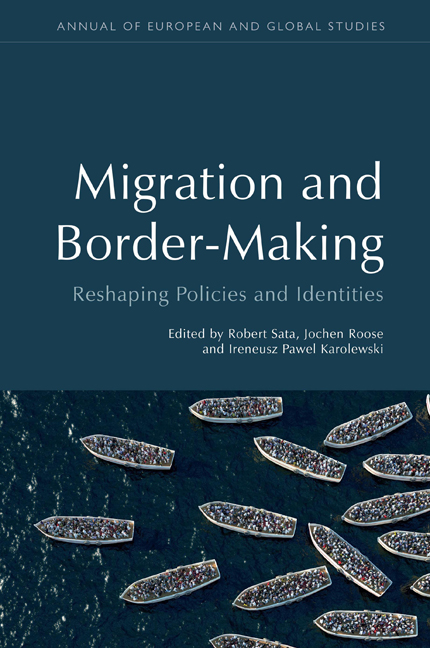Book contents
- Frontmatter
- Contents
- List of Contributors
- Introduction: Patterns and Implications of Migration and Rebordering
- 1 Do Migrants Think Differently about Migration? An Experimentum Crucis for Explaining Attitudes on Migration
- 2 Fencing in the Boundaries of the Community: Migration, Nationalism and Populism in Hungary
- 3 Rethinking Refugee Integration: The Importance of Core Values for Cultural Debate in Germany
- 4 The Unfolding of the Syrian Refugee Crisis in Turkey: From Temporariness to Permanency
- 5 The Middle Eastern Refugee Crisis and the So-Called Islamic State: Motivations of Iraqi Yazidis for Migrating to Europe
- 6 Current Migration Trends in Russia: The Role of the CIS Region Twenty Years after the Collapse of the Soviet Union
- 7 The North Amazon Border: Haitian Flow to Brazil and New Policies
- 8 Macedonian Refugees from the Greek Civil War: From Separation to a Transnational Community
- Index
1 - Do Migrants Think Differently about Migration? An Experimentum Crucis for Explaining Attitudes on Migration
Published online by Cambridge University Press: 08 October 2020
- Frontmatter
- Contents
- List of Contributors
- Introduction: Patterns and Implications of Migration and Rebordering
- 1 Do Migrants Think Differently about Migration? An Experimentum Crucis for Explaining Attitudes on Migration
- 2 Fencing in the Boundaries of the Community: Migration, Nationalism and Populism in Hungary
- 3 Rethinking Refugee Integration: The Importance of Core Values for Cultural Debate in Germany
- 4 The Unfolding of the Syrian Refugee Crisis in Turkey: From Temporariness to Permanency
- 5 The Middle Eastern Refugee Crisis and the So-Called Islamic State: Motivations of Iraqi Yazidis for Migrating to Europe
- 6 Current Migration Trends in Russia: The Role of the CIS Region Twenty Years after the Collapse of the Soviet Union
- 7 The North Amazon Border: Haitian Flow to Brazil and New Policies
- 8 Macedonian Refugees from the Greek Civil War: From Separation to a Transnational Community
- Index
Summary
Introduction
IN THE LAST DECADES and particularly in the last few years we have seen migrants in large numbers across Europe. The opening of the Western European labour markets to the accession countries in Central Eastern Europe motivated many to migrate to the more affluent countries. The United Kingdom was the destination of many, not least because it opened its labour market earlier than others. During the following years, other countries also saw the influx of a considerable number of immigrants. The Great Recession in Europe after 2007 became another driver of inter-EU migration, in this case from South to North (Lafleur and Stanek 2017). Finally, and intensively discussed, the war in Syria jointly with violent conflicts in other world regions contributed to the global migration flows of which a considerable share is directed towards Europe (Elitok and Fröhlich 2019; see also the introduction to this volume for an overview).
Migration and, even more so, increasing migration – to some degree irrespective of the starting level – has a strong impact on societies. Immigrants are not always welcomed. A normative literature discusses intensively to what extent the nation-state has the right, possibly even the duty, to regulate and reduce migration, or whether people have a right to migrate irrespective of or depending on their motives (see the discussion in the introduction to this volume). Empirically, the same question arises. People hold opinions on migration, oft en strong opinions. More oft en than not a majority reacts with rejection and favours a reduction of immigration, if not a complete block on it. The rise of right-wing parties that respond to these sentiments and shift s in the political arena can be a secondary effect of migration streams. In the recent past, Europe has seen these secondary effects with the rise of right populist, xenophobic parties (Thorleifsson 2019; Vetter 2017; Wodak et al. 2013). Brexit has been attributed to the migration issue as well (Gietel-Basten 2016). Probably the attitudes on migration with their impact on political sentiments change the face of European societies more than the migrants ever could.
It comes as no surprise that attitudes on migration are of major interest for social sciences. Various explanations for the rejection of immigration are on offer, some of them partly contradictory or with mixed empirical support.
- Type
- Chapter
- Information
- Transnational Migration and Border-MakingReshaping Policies and Identities, pp. 34 - 51Publisher: Edinburgh University PressPrint publication year: 2020



